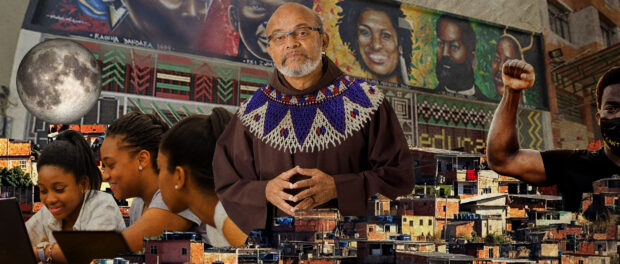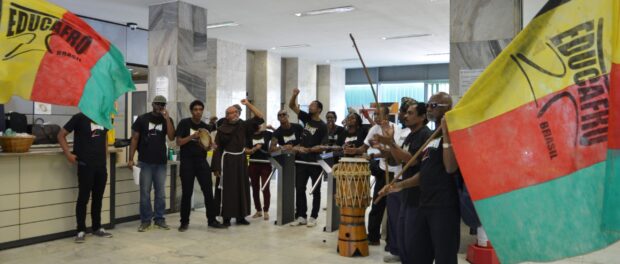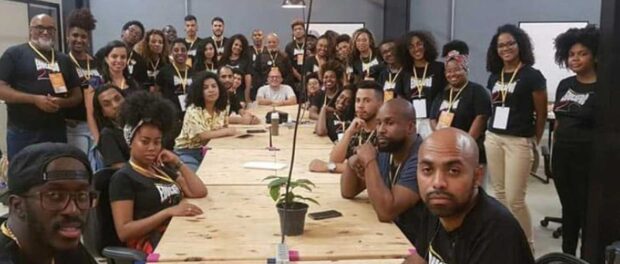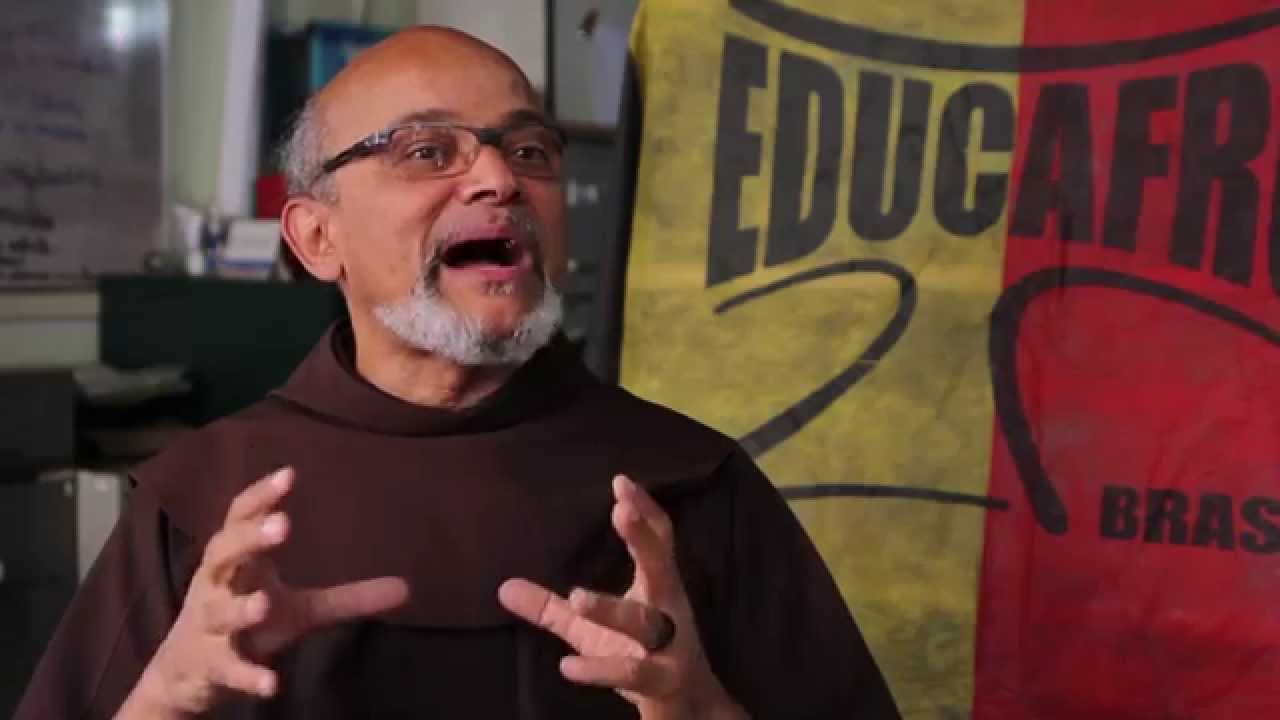
This article is the latest contribution to our year-long reporting project, “Rooting Anti-Racism in the Favelas: Deconstructing Social Narratives About Racism in Rio de Janeiro.” Follow our Rooting Anti-Racism in the Favelas series here.
The idea of Brazil’s Black Movement, of supporting socially disadvantaged groups’ access to Brazil’s elite universities by providing free college entrance exam preparatory courses dates back to the 1970s. In the 1980s, more courses were created, but it was only in the subsequent decade that a mass diffusion of this practice took place. The most considerable expression of this was the Preparatory Course for Blacks and the Needy (PVNC), owing to the number of centers created and due to its seminal nature. According to professor Renato Emerson (IPPUR/UFRJ), PVNC constituted a network of over 70 courses in the Rio de Janeiro Metropolitan Region.
 PVNCs were created and structured through ties of belonging and popular participation. To a large extent, its nuclei are maintained through solidarity and volunteers, creating spaces for the channeling of participants’ potential. According to Emerson, such spaces gave rise to new forms of confronting the unequal and hierarchical construction of the social fabric.
PVNCs were created and structured through ties of belonging and popular participation. To a large extent, its nuclei are maintained through solidarity and volunteers, creating spaces for the channeling of participants’ potential. According to Emerson, such spaces gave rise to new forms of confronting the unequal and hierarchical construction of the social fabric.
When launched in 1993, PVNC had the figures of David Raimundo dos Santos and Alexandre do Nascimento as its principal mentors. The first center was created in the municipality of São João de Meriti, in Greater Rio’s Baixada Fluminense. Right from the start, the network of Rio de Janeiro pré-vestibulares organized more than 70 courses. In 1996, Federal University of Rio de Janeiro (UFRJ) researchers Luiz Carlos Santana and Marcia Contins published an article stating that the initiative had consolidated itself as the first successful experiment in affirmative action in Brazil. In little time, the courses were spread across Brazil, immediately reaching a considerable number of Afro-Brazilians.
David Raimundo Santos is a Franciscan friar and has spent 40 years fighting for the rights of Brazil’s black population. Currently, he directs his fight as national director of Educafro (Education and Citizenship for Afro-Descendants and the Needy). “The first experience was actually the Pré-vestibular for Blacks—we didn’t have the ‘C’ for ‘carentes’ (needy) in the acronym yet. There was already another experience in the city of Salvador, however, the Pré-vestibular Steve Biko, but the high monthly cost, equivalent to a minimum wage, meant it did not reach the majority of the country’s black population. The Pré-vestibular for Blacks (PVN) was the first widespread experience, as its monthly fee was more accessible (2% of the minimum wage), and this amount was used to buy teaching and basic hygiene materials to be used in the classroom and in the school bathrooms.”
Friar David says that PVNC is the product of a meeting of young people, most of them black, that he held at a Catholic Church where he served as an advisor. During the meeting, the friar asked how many were going to attend university and was shocked to discover that only two were. From there came the intuition that there should be a college exam prep course to provide blacks with tools to fight for a better world. Initially, the project was called Pré-Vestibular for Blacks (PVN) and had young people accepted at the Catholic University of Rio de Janeiro (PUC-Rio) in its very first year.
“The PVN teaching methodology was formatted to be light and dynamic, which made it easy to replicate. When it reached more or less 20 nuclei, monthly assemblies were held. There, Alexandre Nascimento, a black professor, and other white professors plotted to remove the word ‘black’ from the name of the course; they had a very fragile view of what it was to be black in Brazil. They wanted it to be a pré-vestibular for the needy, or something of the sort, but never for blacks. I fought tooth and nail, at this assembly, for it to be a pré-vestibular for black people and gave all of the arguments that it was a strategy to shake things up, to provoke the reality of racist Brazilian society. After a lot of back and forth, I presented an alternative with the insertion of the word ‘carente’ (needy) along with the word ‘black.’ Alexandre wanted to include the word ‘social’ and to remove the word ‘black’ completely. After a lot of debate and a vote, the College Entrance Examination Preparatory Course for Blacks and the Needy idea won,” says Friar David.
Beginning with this network of local nuclei offering the course, the Black Movement not only became an institution, but it launched an embryonic way of operating that entailed multiple points of entry, having as its legacy the materialization of the anti-racist debate in favela territories. This objective was reached, above all, through the teaching of a course in Culture and Citizenship. Inspirational in design, the discipline involved numerous professores, specialized in different academic areas, and was delivered to students along with subjects such as Portuguese, math, and others. It came about as a consequence of the discussions of activists aiming to disseminate the anti-racist debate. Therefore, the purpose of the college exam prep courses was not simply to prepare students for the vestibular—Brazil’s college entrance exams at the time (replaced today by the universal ENEM examination)—but for a life of struggle for the emancipation and social and political promotion of blacks and the underprivileged.
In general, courses geared toward grassroots education aim to supply, first and foremost, processes of socialization, where students are able to develop and exercise their civil, political and social rights in their territories instead of prioritizing solely their getting into university—generally the focus of commercial courses. The method of evaluating students is qualitative, focusing on civic learning rather than looking to classify students hierarchically as winners and losers. There is, furthermore, a strengthening of critical awareness that values a culture of participation in a manner that even those that reject politics or the racial debate start to engage with these dimensions.
The immediate effect of PVNC was, therefore, to be joined by a reasonable number of individuals that had always experienced the asymmetry of race relations and that, for the first time, were driven to discuss it in their daily lives—an ideal that until recently had been limited to academic circles and those engaged in black movements.
PVNC was created and organized by Friar David, Alexandre do Nascimento, Antonio Dourado and Luciano Dias. However, when he severed ties with the other leaders, Friar David continued this work founding Educafro, in 1997. According to the friar, the break occurred for two reasons. The first was the conflict around requests for scholarships in private universities. While most founders argued that PVNC students could only apply to public universities, the Franciscan friar argued that they apply for scholarships from private universities, above all from PUC-Rio, because he believed that this university’s high quality should not be limited to the white and rich but should, in fact, be shared with the black and the poor. The second and main reason for conflict, still according to the friar, were the writs of mandamus filed for the exemption of the registration fee for university entrance exams. The Franciscan believed universities should exempt black and poor people from paying the registration fee to take entrance exams, while the other organizers thought the request would come across as a criticism of public universities.
 Losing the dispute in PVNC regarding the suits filed to exempt blacks and underprivileged students from paying fees to take university entrance exams, Friar David said at an assembly meeting that, “as a member of the PVNC, I would respect the decision, but besides being a friar committed to this fight, I am also a citizen and, as a citizen, I am going to file for a collective writ of mandamus, in my name, and whoever wants to benefit from the win can join me. For this, I found a very good lawyer, a real fighter, Doctor Cleto, and with his support we filed the first mandamuses against public universities and had an overwhelming victory.” From then on, “many of the young people that voted against, ran to Educafro, and through Educafro got exemption from paying to take the public university entrance exams. So the fight for exemption began in all four corners of Brazil, starting what is today a public policy. Few people know this, but it was a fierce and courageous fight, that helped us understand that the cause and the fight should be rethought and worked in a more holistic, wholehearted way.”
Losing the dispute in PVNC regarding the suits filed to exempt blacks and underprivileged students from paying fees to take university entrance exams, Friar David said at an assembly meeting that, “as a member of the PVNC, I would respect the decision, but besides being a friar committed to this fight, I am also a citizen and, as a citizen, I am going to file for a collective writ of mandamus, in my name, and whoever wants to benefit from the win can join me. For this, I found a very good lawyer, a real fighter, Doctor Cleto, and with his support we filed the first mandamuses against public universities and had an overwhelming victory.” From then on, “many of the young people that voted against, ran to Educafro, and through Educafro got exemption from paying to take the public university entrance exams. So the fight for exemption began in all four corners of Brazil, starting what is today a public policy. Few people know this, but it was a fierce and courageous fight, that helped us understand that the cause and the fight should be rethought and worked in a more holistic, wholehearted way.”
After the break, PVNC continued with its nuclei in the metropolitan region and Rio de Janeiro proper, while Educafro centers had national coverage. The organization still has five regional offices: Rio de Janeiro, Minas Gerais, Brasília, Baixada Santista, and Bragantina. Its national headquarters is in the city of São Paulo.
 Production engineer Samuel Emílio reported having met David at a lecture ministered by the friar in a leadership training course. There, he noticed that the work of Educafro was transforming lives throughout Brazil. After being initially invited to volunteer by the friar, he has been contributing to the organization since 2016 in a variety of ways. Currently, as a member of Educafro’s general coordination, Emílio points out that, “Educafro is still one of the few organizations that manages to enter peripheral communities and generate deep debates. Often, in society, we have an illusion that all peripheral areas are highly aware of race, class and gender issues, but what we find is that many people still need to reflect deeply on these themes, to be in contact with role models that can help them develop better, less prejudiced views of the world. Many times, Educafro provides the first contact these people have with these issues and with references on these topics, and we do this with a lot of love, a lot of joy because we understand what people have been through, especially in the periphery, through the ideology of whitening, leading them to consume content that prevented them from connecting with their roots.”
Production engineer Samuel Emílio reported having met David at a lecture ministered by the friar in a leadership training course. There, he noticed that the work of Educafro was transforming lives throughout Brazil. After being initially invited to volunteer by the friar, he has been contributing to the organization since 2016 in a variety of ways. Currently, as a member of Educafro’s general coordination, Emílio points out that, “Educafro is still one of the few organizations that manages to enter peripheral communities and generate deep debates. Often, in society, we have an illusion that all peripheral areas are highly aware of race, class and gender issues, but what we find is that many people still need to reflect deeply on these themes, to be in contact with role models that can help them develop better, less prejudiced views of the world. Many times, Educafro provides the first contact these people have with these issues and with references on these topics, and we do this with a lot of love, a lot of joy because we understand what people have been through, especially in the periphery, through the ideology of whitening, leading them to consume content that prevented them from connecting with their roots.”
The racial issue is the driving force behind the founding and struggle that gives visibility not only to PVNC, but to accessible pré-vestibulares in general. College entrance exam prep courses are tools that increase the social capital of the anti-racist fight; they are crucial in legitimizing the construction of policies in the area of affirmative action, specifically, and anti-racism, in general.
EducafroTech: A Black Force in the World of Technology
Currently, grassroots initiatives such as PVNC and Educafro have become better known as Pré-Vestibular Comunitário (PVC) or Pré-Vestibular Social (PVS)—community or social college prep courses. Beyond the terminology, other reconfigurations can be observed. Yet, Educafro college prep centers, for example, continue to have social inclusion and the debate around race and racism as their cornerstone.
Besides the already established debate about human rights, citizenship and anti-racism, Educafro observed that the development of new technologies continued to reproduce old and persistent social inequalities. With the objective of combating social imbalance, Educafro launched the EducafroTech project in 2018. This program gives black and peripheral young people access to new Information Technology (IT) languages and tools, developing professionals in the area of technology in an anti-racist way, for an anti-racist professional performance in the technology sector.
In the aforementioned project, the organization offers courses in IT with the purpose of its associates accessing the job market in this area. This is an IT training initiative aimed at the black community. Its first result was the construction of an IT class with 32 people, comprised of 29 black and three white students. The group respected the principle of diversity, taking into account gender parity and the presence of lesbians, gays and transexuals.
View this post on Instagram
First class of EducafroTech graduates. You followed these warriors for three weeks on @educafro’s Stories. This was just the beginning of a great journey, one filled with challenges, struggles and many conquests.
You have made history
#certificatesawarded
EducafroTech is available for young people and adults in Brazil’s five regions. Through it, students receive content according to the needs of the job market. They are also taught civic learning and constitutional law classes, which make a difference in the areas in which they operate. At the end of the course, Educafro connects students with partner businesses that are looking for IT professionals with the highest quality training, as is the profile of Educafro’s students.
Another singularity emerged, especially in the pandemic: online pré-vestibulares. Educafro established a partnership with an online course platform specialized in preparing students for the ENEM and other exams. In this way, all associates have free access to the application.
Leonardo Marcilino, an EducafroTech student, says that, “at the beginning of the pandemic, I was enrolled in an online pré-vestibular with the distance learning format. I didn’t adapt to it, though. It was then that my dad showed me a video with Lázaro Ramos speaking about EducafroTech. I always liked technology and always wanted to go deeper into it, but all the courses I looked at were paid for. Educafro was the only one that offered everything completely for free. It was very good! It’s an excellent experience for someone who wants to learn about technology, for someone who wants a basic idea or even for someone that wants to deepen [their knowledge] and become a professional.”
We can observe that the strategies used by EducafroTech and online pré-vestibulares have been crucial in taking the anti-racism debate closer to the reality of young blacks, favela and periphery residents, who had their right to an education denied during a big part of the pandemic. With these two new projects, a new configuration was imposed on the organization because both the online pré-vestibular and EducafroTech, can be accessed by whoever has access to a mobile phone and to the Internet, increasing the number of students trained through these educational methodologies and anti-racist technologies exponentially.
In this way, the organization has adapted to a new language and an expanded audience. As a teacher of Citizenship at Educafro since 2018, and as a member of Educafro’s general coordination for the region of Rio de Janeiro since 2019, I, Felipe Bellido, notice the residents’ associations of favelas and peripheral territories’ increased attempts at making online pré-vestibulares accessible for residents, keeping in mind that the associations themselves have Internet access. This has allowed for regular and productive contact between Educafro and its audience in various territories, besides continuing the work of offering opportunities to insert these individuals into higher education and the job market, without losing sight of the commitment to highly relevant social debates and anti-racist practice.
About the author: Felipe Bellido graduated in Political Science from UNIRIO (2015), has a master’s in Social Sciences from UFRRJ (2018) and a special certificate in Public Policy for the Promotion of Equality from Clacso (2020). He is volunteer vice-coordinator of Educafro Rio, a doctoral student in Social Sciences at PUC-Rio, and a participant of the Rights, Recognition and Inequalities Research Group (GEDRED) there. Bellido researches public policy, inequality, affirmative action and grassroots movements.
About the artist: Born and raised in Complexo do Alemão, David Amen is co-founder and communication producer of the Roots in Movement Institute, a journalist, a graffiti artist, and an illustrator.
This article is the latest contribution to our year-long reporting project, “Rooting Anti-Racism in the Favelas: Deconstructing Social Narratives About Racism in Rio de Janeiro.” Follow our Rooting Anti-Racism in the Favelas series here.







